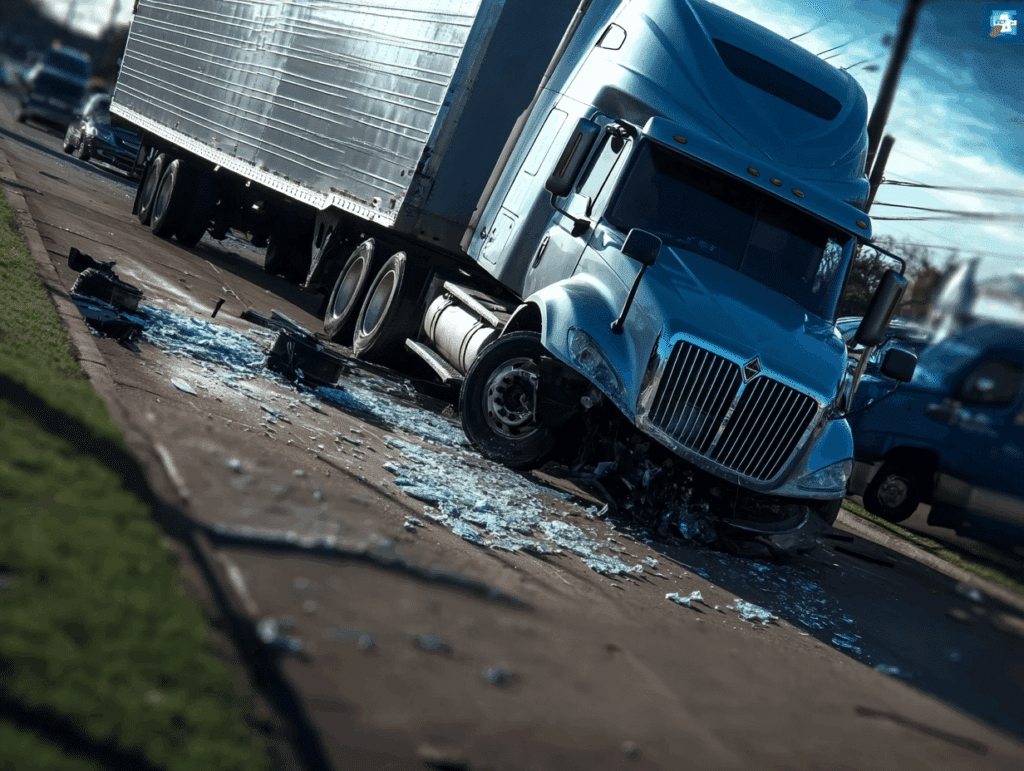Unlike typical car accidents, collisions involving semi-trucks involve multiple parties, complex insurance policies, and higher stakes due to the severity of injuries. Understanding the proper steps to take after an 18-wheeler accident helps you build a stronger case and avoid costly mistakes that could jeopardize your claim.
Let's Go Beyond, to Bring You Back
Let's get you the compensation you're entitled to. Get a FREE Consultation today.
Let's Go Beyond, to Bring You Back
You deserve the compensation you’re entitled to, call for your FREE Case Review today.
Immediate Steps at the Accident Scene
Your safety comes first. If you can move without causing further injury, get to a safe location away from traffic. Turn on your hazard lights and set up warning triangles or flares if you have them to alert other drivers.
Call 911 immediately, even if the accident seems minor. You need police documentation of the crash, and some injuries don’t show symptoms right away. Tell the dispatcher exactly where you are and whether anyone needs medical attention.
Accept medical evaluation from paramedics even if you feel okay. Adrenaline can mask pain and injuries like whiplash, internal bleeding, or traumatic brain injuries may not be apparent initially. Refusing medical care at the scene can give insurance companies ammunition to dispute your injuries later.
Document Everything You Can
While still at the scene, gather as much evidence as possible. Use your phone to take photos and videos of:
The damage to all vehicles involved should be captured from multiple angles. The position of the vehicles on the roadway. Skid marks, debris, and road conditions. Traffic signs and signals are nearby. The truck’s license plate, DOT number, and company information. Your visible injuries.
Get contact information from the truck driver, including their name, phone number, driver’s license number, and commercial driver’s license details. Write down the trucking company name and the name of their insurance carrier, if available.
Collect witness information. Anyone who saw the accident happen can provide valuable testimony. Get names and phone numbers from witnesses before they leave the scene.
What Not to Say After the Accident
Be careful about what you say at the scene. Don’t apologize or admit fault, even if you think you might have contributed to the accident. Simple statements like “I’m sorry” can be twisted and used against you later.
Stick to the facts when talking to police officers. Describe what happened without speculation or assumptions about who caused the accident.
When the trucking company’s insurance adjuster contacts you, don’t give a recorded statement without speaking to an attorney first. These adjusters are trained to ask questions designed to minimize your claim. Politely decline and say you’ll provide information through your lawyer.
Seek Medical Treatment Right Away
Visit a doctor or emergency room as soon as possible after the accident, even if you have already received care from paramedics. Some injuries take hours or days to fully develop.
Follow through with all recommended treatments and appointments. Missing medical appointments or failing to follow your doctor’s orders gives insurance companies reason to argue that your injuries aren’t serious.
Keep detailed records of all medical expenses, including bills, prescriptions, and travel to appointments. These documents prove your damages and help calculate fair compensation.
Truck Accident Attorney
Get Compensated For Your Injuries & Damages! Call Us For A FREE Case Review And Know What Your Case Is Worth.
Report the Accident to Your Insurance Company
Contact your insurance company to report the accident, but remember you’re only required to provide basic facts about what happened. You don’t need to give a detailed recorded statement or agree to a quick settlement before understanding the full extent of your injuries.
Texas law requires drivers to report accidents that cause injury, death, or property damage exceeding $1,000. File this report with the Texas Department of Transportation within 10 days of the accident.
Preserve Physical Evidence
Keep damaged personal items from the accident, including torn clothing, broken glasses, or damaged phones. These items help demonstrate the collision’s force and severity.
Don’t repair your vehicle until your attorney and insurance company have inspected and photographed it. Once repairs are made, that evidence is gone forever.
If your vehicle is totaled, take thorough photos before the insurance company takes possession. Document the interior and exterior damage from every angle.
How Does Insurance Work for Semi-Trucks?

Most trucking companies carry multiple insurance policies that might include liability coverage, cargo insurance, and umbrella policies. After an accident, you may be dealing with several insurance companies simultaneously.
The trucking company, the driver, the cargo owner, the truck manufacturer, and the maintenance company could all share liability depending on what caused your accident. Each party typically has separate insurance coverage, which is why 18-wheeler accident cases become complicated quickly.
Insurance companies for commercial trucks have teams of adjusters and lawyers working to minimize payouts.
They start investigating immediately, often sending representatives to the accident scene before you’ve even left in an ambulance.
What Happens If You Get Hit by a Semi-Truck?
The consequences of being hit by a semi-truck are typically far more severe than regular car accidents. An 18-wheeler can weigh up to 80,000 pounds fully loaded, while passenger vehicles average 4,000 pounds. This massive weight difference means greater impact forces and more serious injuries.
Common injuries from 18-wheeler accidents include traumatic brain injuries, spinal cord damage, broken bones, internal organ damage, severe burns, and amputations. Many victims face months or years of recovery, multiple surgeries, and permanent disabilities.
Beyond physical injuries, you may experience emotional trauma, anxiety about driving, depression, and financial stress from mounting medical bills and lost wages. Texas law allows you to seek compensation for all these damages, not just your medical expenses.
The trucking company’s insurance team will likely contact you quickly, sometimes within hours of the accident. They may offer a fast settlement that sounds generous, but it typically falls far short of covering your long-term needs. Once you accept and sign a release, you cannot go back and ask for more money later, even if your injuries turn out to be worse than initially thought.
| Step | What To Do | Why It Matters |
|---|---|---|
| 1. Put Safety First & Call 911 | Move to a safe spot away from traffic, turn on hazard lights, and use cones/flares if available. Call 911 so police and EMS can respond, even if the crash seems minor. | Protects you from further harm and creates an official crash report that documents the scene, injuries, and parties involved. |
| 2. Accept On-Scene Medical Care | Let paramedics evaluate you, even if you “feel fine.” Don’t downplay symptoms or refuse care. | Adrenaline can hide serious injuries. Early treatment links your injuries to the crash and prevents insurers from arguing you weren’t really hurt. |
| 3. Document the Scene | Take photos/videos of all vehicles, damage, skid marks, debris, road and weather conditions, traffic signs, the truck’s plate/DOT number/company name, and your visible injuries. Get names and phone numbers for the truck driver and any witnesses. | Strong visual and witness evidence helps prove how the collision happened and supports your version of events later. |
| 4. Watch What You Say | Do not apologize, admit fault, or speculate about what caused the crash. When speaking with police, stick to the facts. Decline any recorded statement for the trucking company’s insurer until you talk to an attorney. | Simple phrases like “I’m sorry” can be twisted to blame you. Adjusters use recorded statements to minimize or deny your claim. |
| 5. Get Follow-Up Medical Treatment | Visit an ER, urgent care, or your doctor as soon as possible. Follow all treatment recommendations, attend appointments, and keep copies of bills, records, and prescriptions. | Consistent medical care shows the seriousness of your injuries and provides the documentation needed to calculate fair compensation. |
| 6. Report the Crash to Your Insurer | Notify your insurance company promptly and provide basic facts about the collision. Do not agree to detailed recorded statements or quick settlements before you understand your injuries. | Timely notice is often required by your policy. Limiting what you say helps you avoid mistakes that could reduce your recovery. |
| 7. Preserve Physical Evidence | Save damaged clothing, personal items, car seats, and other objects from the crash. Don’t repair or dispose of your vehicle until it has been thoroughly photographed and inspected. | Physical damage tells the story of how severe the impact was and can be critical evidence in settlement negotiations or trial. |
| 8. Understand Trucking Insurance | Commercial trucks typically carry high policy limits and multiple layers of coverage. Several parties—driver, trucking company, cargo owner, manufacturer, and maintenance providers—may share fault. | More insurance and more potential defendants mean more opportunities for recovery—but also more aggressive defense teams working against you. |
| 9. Don’t Rush to Accept a Settlement | Expect the trucking company’s insurer to contact you quickly with a “fast” offer. Avoid signing anything or accepting money before you know the full extent of your injuries and future needs. | Early offers are usually far below the true value of a serious truck-accident case. Once you sign a release, you typically can’t ask for more later. |
| 10. Talk to a Truck Accident Attorney | Contact an experienced 18-wheeler accident lawyer at Wyly & Cook Injury & Insurance Lawyers for a FREE case review. We can investigate, secure black box data and logs, handle adjusters, and pursue all responsible parties. | Trucking companies have teams of lawyers protecting them. Having your own legal team levels the playing field and helps you pursue the compensation you’re entitled to. |
How Does Insurance Work When It’s Not Your Fault?
When another driver causes your accident, you file a claim against their liability insurance. In Texas, the at-fault driver’s insurance should cover your medical expenses, property damage, lost wages, and pain and suffering.
Texas follows a modified comparative fault rule. You can recover damages as long as you’re not more than 50% responsible for the accident. Your compensation gets reduced by your percentage of fault. If you’re found 20% at fault, you receive 80% of the total damages.
The insurance company for the at-fault party will investigate your claim. They’ll review the police report, interview witnesses, examine vehicle damage, and analyze the accident scene. Their goal is to pay as little as possible, so they’ll look for any reason to deny your claim or reduce the payout.
You’re not required to accept the insurance company’s first offer. Most initial offers are intentionally low. Having legal representation often results in significantly higher settlements because attorneys understand the true value of your case and won’t let insurance companies take advantage of you.
Let's Go Beyond, to Bring You Back
Let's get you the compensation you're entitled to. Get a FREE Consultation today.
Let's Go Beyond, to Bring You Back
You deserve the compensation you’re entitled to, call for your FREE Case Review today.
What Is the Hardest Injury to Prove?

Insurance companies frequently dispute soft tissue injuries, claiming they’re exaggerated or unrelated to the accident. They argue that without visible proof like broken bones or surgical scars, the injury must not be serious.
However, soft tissue damage can cause chronic pain and limit your ability to work and enjoy life. Proving these injuries requires consistent medical documentation, expert testimony, and sometimes advanced imaging like MRIs.
Psychological injuries like PTSD, anxiety, and depression are also challenging to prove. Insurance adjusters can’t see mental trauma, making them skeptical about these claims. Working with mental health professionals who document your symptoms and treatment creates a stronger record of your psychological injuries.
Traumatic brain injuries fall into a gray area. Severe TBIs show up on CT scans, but mild traumatic brain injuries or concussions may not appear on imaging despite causing significant symptoms like memory problems, headaches, and difficulty concentrating.
Contact an Experienced Truck Accident Attorney
The complexity of 18-wheeler accidents makes legal representation necessary. Trucking companies have experienced lawyers defending them from the moment an accident occurs.
An attorney can investigate your accident thoroughly, identifying all liable parties and applicable insurance policies. They’ll handle communications with insurance companies, protecting you from saying something that could hurt your case.
Lawyers understand federal trucking regulations and Texas transportation laws. They know how to obtain and preserve evidence like the truck’s black box data, driver logs, maintenance records, and company safety records that might disappear if not secured quickly.
Most truck accident attorneys work on contingency, meaning you pay nothing unless they recover compensation for you. This arrangement allows you to have strong legal representation without upfront costs during an already financially stressful time.
At Wyly & Cook Law Firm, we understand the physical, emotional, and financial toll that 18-wheeler accidents take on victims and families. Our team has the experience and resources to take on large trucking companies and their insurers.
Don’t try to handle a commercial truck accident claim alone. The decisions you make in the days and weeks following your accident affect your recovery for years to come. Contact our office today for a free consultation to discuss your case and learn about your options for recovering the compensation you deserve.
Recommended Article(s)


